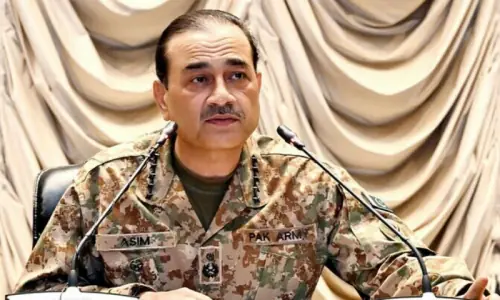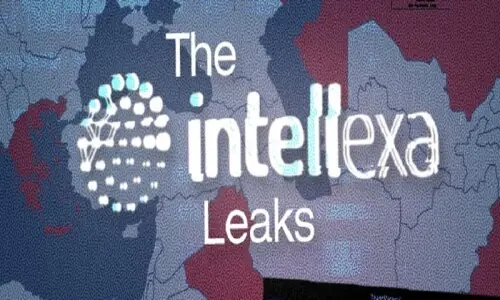WHEN he arrived on the Indian firmament as finance minister in 1991, Dr Manmohan Singh’s first step was to engage in a secret deal with the IMF ostensibly to swing a billion-dollar loan for his country’s defaulting economy.
Howls of protests greeted reports of the deal in parliament amid widespread fears of a sell-out. Senior MPs, led by Mr Atal Behari Vajpayee, pleaded with the finance minister to be taken into confidence about the secret agreements involved, insisting that the Indian people ought to be told what was being negotiated to improve their lot.
But Dr Singh told The Economic Times instead that if all the clauses of the deal were disclosed, there would be riots on the streets of Delhi. Those were strong words and his rivals jeered him as an inexperienced politician. Eventually though it was he who won the battle for the IMF deal, not its opponents.
Perhaps, Dr Singh quietly envies the Chinese system. He did tell parliament once, not without a hint of regret, that India’s democracy had to bear the burden of not having a “supreme” like the neighbouring country. Now, as he prepares to wind up a controversial tenure as prime minister, his penchant for keeping the public out of his decision-making loop has come full circle. Even today, as the head of an effectively fragile coalition, Dr Singh is unwilling to trust the Indian parliament with the clauses of the civil nuclear agreement that he proposes to sign with the IAEA, a pact he has staked his reputation on.
Sovereign states are known to conduct secret talks and sign secret pacts with other sovereign nations. India itself has had pacts including secret clauses with several countries, but they were mostly done bilaterally.
The logic of the current standoff about secrecy is all the more baffling since it involves sharing our secrets with the rest of the world, but not with Indians. It implies that Dr Singh would rather give details of an India-specific agreement with the multi-member IAEA, of which its key rival China is a major component. But the Indian parliament does not have the right to know what is being discussed with the rest of the world, including China, and, of course, the United States.
On the contrary, his Leftist partners, who he incidentally described as great patriots at the start of their honeymoon in May 2004, were persuaded to let the government go to the IAEA secretariat and negotiate a draft safeguards agreement.
The deal covers all Indian civilian nuclear facilities to be placed under safeguards once the controversial Indo-US nuclear agreement goes into effect. Even The Hindu newspaper, which had initially supported the civil nuclear deal, felt constrained to wonder what the ‘frozen text’ might be containing.
Dr Singh’s administration has expressed its unwillingness to share the safeguards agreement on the ground that it has not been sent yet to the IAEA’s board of governors.
“This is an untenable argument,” said The Hindu. The UPA’s allies are being asked, in effect, to support an agreement sight unseen. Moreover, the IAEA safeguards agreement is not some routine affair. It is part of a project that vitally concerns India’s nuclear energy and strategic future over the long term. “Non-consultation, non-transparency, and a secretive mindset characterised the handling of the nuclear deal from the time it was initiated in July 2005,” The Hindu said in an editorial comment. But from all accounts Dr Singh would rather resign than yield to his allies’ demand for a little more transparency.
When Dr Singh arrived on the scene 17 years ago, India’s economy was reeling from the double blast of a collapsed captive market the Soviet Union and spiralling oil prices caused by the senior Bush’s misadventures in the Gulf. A double-digit inflation in 1991 seemed set to be getting further out of control even then. In this respect there is very little difference from the situation as it obtained on his advent and today when Dr Singh has threatened to quit over what his key allies consider a dubious nuclear deal. Oil prices are going through the roof. Inflation has crossed the 13-year old high of 11 per cent. And exports are in a bind in view of a global recession worsened by a weakened dollar. The excessive focus on the nuclear deal is being seen by his opponents as a ruse to deflect the spotlight from a disastrous economic course he would be leaving behind for India to pursue. Whether he goes tomorrow or orders elections next year it would be difficult to surmise the possibility that the civil nuclear deal would open for India.
However, what we can do is to glean lessons from the past. We can see how much of the promise he made 17 years ago when he was engaged in a similar secretive pact with the IMF was fulfilled. And what could be a better way than to have a checklist from his reply to the first budget speech he made in July 1991. Some excerpts below are mostly self-explanatory when compared to the given context.
Dr Singh said: “Some people describe our agenda as pursuit of liberalisation. Mr Speaker, Sir, a more appropriate way to describe our agenda would be to call it an agenda for India’s second liberation, liberation from the ancient scourge of poverty, ignorance and disease which have been the inevitable lot of millions of people in this country for centuries. It is an agenda for ushering a second Industrial Revolution, a second Green Revolution.” To what extent has Dr Singh kept that promise?
“…Much has been done since independence to soften the harsh edges of mass poverty. Our nation can take legitimate pride in its many faceted achievements. (I’m glad he said that for all the criticism his acolytes love to heap on Nehruvian socialism, considered an ugly word since 1991) But there is a vast unfinished task. There are still far too many people with tearful eyes in this country. The misery and the squalor of vast urban slums that have sprung up all over the country mocks at the laughter and the mirth emanating from the Five Star Hotels and Club Rooms.” Have the slums disappeared? How many tearful eyes were addressed?
Dr Singh continues: “Even today, 44 years after independence, you can still, see on a cold wintry morning, a young woman having a bath in the sacred Ganga and then sitting in the sun to dry her clothe. Why? Because she does not have a second sari. We have thus a vast unfinished task before us.” So how many more women by the Ganga’s banks have got a second pair of sari in 17 years? But wait. The best is yet to come.
“Our Government has been in office for barely one month and a half. But in this short span of time, we have altered the agenda for the national debate. The divisive issues of Mandir-Masjid politics and the emotional divide brought about in the wake of forward-backward caste controversies are beginning to take a back seat,” Dr Singh said confidently, a more than a year before Ayodhya happened.
“The nation seems to be fed up with the politics, which thrive on suspicion, hatred, distrust of one fellow citizen and which exploits societal tensions and conflicts for the pursuit of narrow partisan angles. It is yearning for a new politics, a politics, which would help to mediate and reconcile the various societal tensions and conflicts built into the body politic of a poor country trying to modernise itself. This is the task we have set before our nation. This is the new politics we will pursue a politics which is a servant of social sympathies, a politics which is a purposeful instrument of social change, a politics which regards power as a sacred social trust to be used for the good of society and not for self-aggrandizement.”
To be fair to Dr Singh we should not hold him responsible for the subsequent events in Ayodhya and Gujarat. But there would be no harm in taking his promises with a pinch of salt. And this includes the promises he has made to parliament about the nuclear deal with the United States. There are credible reports that India has enough though mysteriously untapped uranium to pursue its independent domestic goals for the next 40 years. We need some transparency in the nuclear project before taking the next crucial steps. That’s a key lesson to learn from our secret tryst with the IMF then and IAEA now.
jawednaqvi@gmail.com































